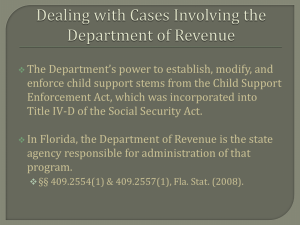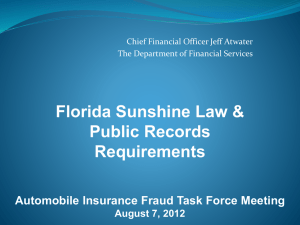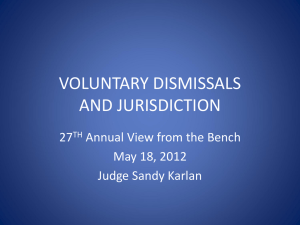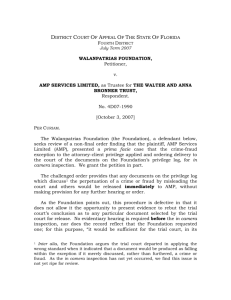Outline of Habeas Corpus and Implied Consent Training
advertisement
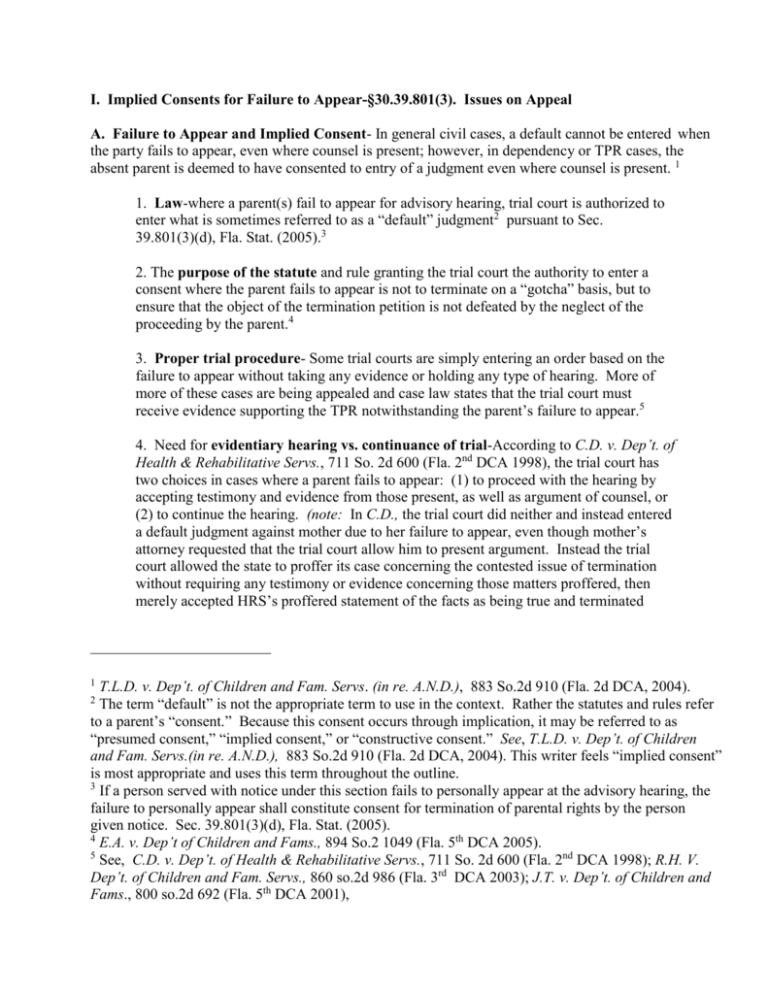
I. Implied Consents for Failure to Appear-§30.39.801(3). Issues on Appeal A. Failure to Appear and Implied Consent- In general civil cases, a default cannot be entered when the party fails to appear, even where counsel is present; however, in dependency or TPR cases, the absent parent is deemed to have consented to entry of a judgment even where counsel is present. 1 1. Law-where a parent(s) fail to appear for advisory hearing, trial court is authorized to enter what is sometimes referred to as a “default” judgment2 pursuant to Sec. 39.801(3)(d), Fla. Stat. (2005).3 2. The purpose of the statute and rule granting the trial court the authority to enter a consent where the parent fails to appear is not to terminate on a “gotcha” basis, but to ensure that the object of the termination petition is not defeated by the neglect of the proceeding by the parent.4 3. Proper trial procedure- Some trial courts are simply entering an order based on the failure to appear without taking any evidence or holding any type of hearing. More of more of these cases are being appealed and case law states that the trial court must receive evidence supporting the TPR notwithstanding the parent’s failure to appear.5 4. Need for evidentiary hearing vs. continuance of trial-According to C.D. v. Dep’t. of Health & Rehabilitative Servs., 711 So. 2d 600 (Fla. 2nd DCA 1998), the trial court has two choices in cases where a parent fails to appear: (1) to proceed with the hearing by accepting testimony and evidence from those present, as well as argument of counsel, or (2) to continue the hearing. (note: In C.D., the trial court did neither and instead entered a default judgment against mother due to her failure to appear, even though mother’s attorney requested that the trial court allow him to present argument. Instead the trial court allowed the state to proffer its case concerning the contested issue of termination without requiring any testimony or evidence concerning those matters proffered, then merely accepted HRS’s proffered statement of the facts as being true and terminated T.L.D. v. Dep’t. of Children and Fam. Servs. (in re. A.N.D.), 883 So.2d 910 (Fla. 2d DCA, 2004). The term “default” is not the appropriate term to use in the context. Rather the statutes and rules refer to a parent’s “consent.” Because this consent occurs through implication, it may be referred to as “presumed consent,” “implied consent,” or “constructive consent.” See, T.L.D. v. Dep’t. of Children and Fam. Servs.(in re. A.N.D.), 883 So.2d 910 (Fla. 2d DCA, 2004). This writer feels “implied consent” is most appropriate and uses this term throughout the outline. 3 If a person served with notice under this section fails to personally appear at the advisory hearing, the failure to personally appear shall constitute consent for termination of parental rights by the person given notice. Sec. 39.801(3)(d), Fla. Stat. (2005). 4 E.A. v. Dep’t of Children and Fams., 894 So.2 1049 (Fla. 5th DCA 2005). 5 See, C.D. v. Dep’t. of Health & Rehabilitative Servs., 711 So. 2d 600 (Fla. 2nd DCA 1998); R.H. V. Dep’t. of Children and Fam. Servs., 860 so.2d 986 (Fla. 3rd DCA 2003); J.T. v. Dep’t. of Children and Fams., 800 so.2d 692 (Fla. 5th DCA 2001), 1 2 mother’s rights. The Second DCA found that procedure utilized by the trial court in C.D. was an abuse of discretion and reversed and remanded the matter.) B. Motions To Set Aside Judgment-most of the appellate cases on this issue directly deal with the trial court’s refusal to set aside an order terminating a parent’s rights based on “implied consent”. Because Florida public policy favors adjudication on the merits over an entry of default, a properly filed motion to vacate an implied consent to termination of one’s parental rights should be liberally granted. 1. Law- T.L.D. v. Dept. of children and Fam. Servs. (In re A.N.D.), 883 So. 2d 910 (Fla. 2d DCA 2004) sets forth a three-part test for vacating an implied consent. a. party seeking to vacate the consent must act with due diligence, b. demonstrate excusable neglect, and c. demonstrate the existence of a meritorious defense. 6 1. at a minimum, a “meritorious defense” should include any meritorious arguments regarding the grounds for termination, the manifest best interest of the child, and the least restrictive means of protecting the child. 7 d. the moving party carries the burden of persuasion. e. Standard of Review is abuse of discretion. f. For examples where the appellate court found that the trial court abused its discretion by refusing to set aside or vacate a order based implied consent see, E.A. v. Dept. of Children and Fams., 894 So.2d 1049 (Fla. 5th DCA 2005)(father arrived 22 minutes late for adjudicatory hearing due to traffic); R.H. V. Dep’t. of Children and Fam. Servs., 860 so.2d 986 (Fla. 3rd DCA 2003)(father’s reasonable confusion over trial dates); T.B. v. Dep’t. of Children and Fam. Servs., 920 So.2d 170 (Fla. 2d DCA 2006)(denial of father’s request for continuance was abuse of discretion where father’s inability to appear at rescheduled hearing was beyond his control). II. Habeas Corpus (belated appeals) A. Issues on appeal-where parent misses the 30 day window for filing a notice of appeal and trial court enters a general order allowing the parents to pursue a belated appeal without considering elements necessary for habeas relief. 6 7 See also, E.S. v. Dep’t. of Children and Family Svcs., 878 So. 2d 493 (Fla. 2d DCA 2004). T.L.D. v. Dept. of Children and Fam. Servs. (In re A.N.D.), 883 So. 2d 910 (Fla. 2d DCA 2004) 1. Jurisdictional rule -Notice of Appeal must be timely filed (30 days from rendition of final order). This requirement is jurisdictional and neither the appellate nor the trial court is authorized to extend the time for taking an appeal, and the parties cannot agree to extend the date for filing. 8 2. Law-In termination of parental rights cases, the proper vehicle for relief to obtain a belated appeal is to file a petition for writ of habeas corpus.9 a. Writ of habeas corpus is designed as speedy method of affording judicial inquiry into cause of alleged unlawful custody of an individual and has been authorized as a remedy for ascertaining a parent’s right to custody of his or her children.10 b. Writ of habeas corpus should be filed with the trial court-permits resolution of any factual issues as well as any defenses, including those predicated upon laches. c. Evidentiary Hearing-trial court must conduct evidentiary hearing on issue of habeas relief-need to resolve the factual circumstances underlying petition.11 3. Implications-If parent misses the 30 day window in which to file an appeal, must a. File a petition for writ of habeas corpus in the trial court, and b. Set hearing date, absent stipulation by all parties. (no ex-parte orders) c. At hearing, facts that allegedly led to missed deadline must be proved by substantial competent evidence, including but not limited to: 1. missed deadline for filing notice of appeal was not due to fault of parent, but rather due to ineffective counsel or state has frustrated appeal in some way. 2. lack of equitable defense (laches). d. Stipulation by all parties only where facts and circumstances are undisputed and no intention to assert defenses to belated appeal. 8 See, In re. T.D., 623 So.2d 851(Fla. 1st DCA 1993). In re. E.H., 609 So.2d 1289 (Fla. 1992)(Supreme court created a narrow exception to jurisdictional bar for late filing of notice of appeal for parent who sought untimely appeal of an order termination parental rights because mother’s attorney’s mistake should not be imputed to mother when consequence of mistake is mother’s loss of custody.) See also, T.D., 623 So.2d 851 (Fla. 1st DCA 1993). 10 In re. E.H., 609 So.2d 1289 (Fla. 1992)( 11 See, In re. T.D., 639 So.2d 704 (Fla. 1st DCA 1994); M.W. v. Dep’t. of Children and Fams., 769 So. 2d 513 (Fla. 1st DCA 2000); L.W. v. Dep’t. of Children and Fams., 830 So.2d 274 (Fla. 1st DCA 2002); In re. B.H., 892 So.2d 639 (Fla. 2d DCA 2005). 9
